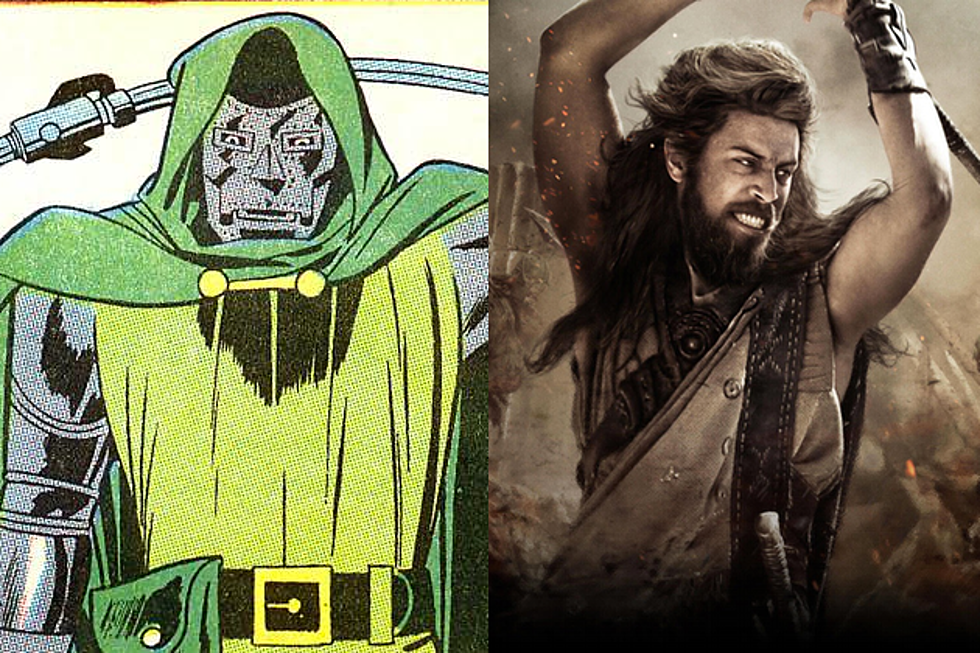
Ask Chris #191: Dr. Doom, The Gold Standard Of Comic Book Villainy
Q: Why is Doctor Doom the gold standard of supervillains? -- @franzferdinand2
A: In case you missed it a few weeks back, I wrote a column about the differences between Lex Luthor and the Joker, and mentioned that while those are two characters I like an awful lot, Dr. Doom is far and away the gold standard of supervillainy. He's compelling, he's sinister, he's got a great design that's lasted, virtually unchanged, for 50 years, and he can be dropped into almost any type of story and work beautifully. In short, he's the single greatest villain in superhero comics history.
Well, unless you count Bob Kane, but that's a whole other thing.
What makes Dr. Doom so great -- or at least, one of the things, and arguably the most important -- is how adaptable he is. It might just be because my attention span was rotted away at a very young age by the Nintendo Entertainment System, but I've always been drawn to characters that can work in a wide variety of stories. It helps them stand the test of time, that the core of the character can remain solid while everything else can be shifted and arranged to get the most out of a situation.
Batman's probably the best example of that, because there are so many different versions of him that have been so prominent over the years that it's kind of become his calling card. The gritty vigilante is just as valid as the campy crimefighter, who's just as valid as the world traveling adventurer, and the idea that all of these things can coexist is a huge part f what I love about that dude, but he's not the only one. If you go down the list of my favorite characters, you'll see that it's a common trait. Spider-Man and the Thing have long series that are all about teaming them up with whoever wasn't busy that month. Even Jimmy Olsen, who's tied in so tightly with not just a single character, but a single era of that character's 75-year history, is a character whose "strange transformations" became a running gag that was always leading to something that was new and weird.
Even at their best though, none of them work quite as well as Dr. Doom, if only because Dr. Doom is extremely adaptable, without requiring you to change anything about his character. With a few minor exceptions, most of which are purely cosmetic, there are no distinct "eras" of Dr. Doom. There's just one continuous character who works perfectly in a wide variety of stories.
And the amazing thing is, he's been like that since day one.
I'm always fasciated by the way that characters evolve and change over the years -- again, this is something I've thought a lot about when it comes to Batman -- but Dr. Doom is one of those rare major characters that arrives fully formed. Batman, Superman, even the Fantastic Four themselves all took a little while to find their footing and really become the characters that we know. I mean, Batman didn't even have dead parents until six months in. But Doom? Doom's pretty much been Dr. Doom since that very first panel.
Sure, the design was refined a little and made more superheroic (like the Mole Man and Namor, Doom's original look feels like it was a throwback to the pre-Marvel days of Golden Age Timely books and Atlas monster comics), and sadly, that vulture never really made a return appearance, and he has, of course, been built on and refined since then, but in terms of personality, it's all there. The ego, the hatred, the ruthlessness and deception, the pettiness, the excess -- dude just casually sits there petting a tiger like it's not even a thing -- it's all right there from the first story. Which, I feel I should remind you, is about Dr. Doom sending the Fantastic Four back in time to steal pirate treasure.
Incidentally, I love the fact that Dr. Doom just cold built a time machine in his first appearance and is using it for what amounts to petty (if mystical) thievery, and that this is such a founding moment for the Marvel Universe that his Time Platform has become something that's just casually referened and accepted as part of the world those characters live in. Referring to the energy trace of time travel as "Von Doom radiation" is literally my favorite non-Nextwave thing that Warren Ellis has ever written:
But yeah, everything's there. He's adept at both science and sorcery, he hates Reed Richards because of what he saw as a challenge to his intelligence, and he sees other people as pawns in his complicated schemes for domination. He's the monarch of a foreign country, which brings a global scale to the New York-based Marvel Universe in a way that even introducing invading aliens didn't. And all of that adds up to one very important aspect of Dr. Doom: He's not just a Fantastic Four villain, he's a Marvel Universe villain.
And really, he's the first one. He may have even been the first in superhero comics -- Superman and Batman had been teaming up since the '40s along with the original Justice Society, but nobody had really made the concerted effort to build a cohesive universe in the way that Lee and Kirby (and Ditko, and Ayers, and Heck, etc.) were doing at Marvel. Part of that just meant that superheroes could hang out together, but it was just as important that the villains could float from one book to another, too. Before Doom, the antagonists for the FF had been characters that would become pretty solidly entrenched as Fantastic Four Villains, like the Mole Man. Namor, even after he flipped back into being a protagonist, remains primarily associated with the FF, even though he's been a Defender, an Avenger, an Invader and an X-Man, and even though he started 20 years earlier as a solo act. The Skrulls would get there eventually, but it wouldn't be until the '70s that they really became a "cosmic" threat, and even then, individual characters like the Super-Skrull, Paibok and Lyja the Lazer-Fist (the best name in comics) would be inextricably linked with the FF.
You could argue that Dr. Doom is, too, since his major motivation from the start was his intense, specific hatred of Reed Richards, but he branches out very early. He's as much a villain for the FF as anyone, sure, but it's not at all out of the question for him to show up and ruin Spider-Man's day, either.
That story happens in 1963, right at the beginning of the Marvel Universe, and it sets a precedent that shapes the entire line from that point on, specifically Doom. Because the superheroes are so closely knit, because they do hang out together, and because Doom has that "science and sorcery" thing that gives him so many different story hooks, he can show up anywhere.
He and Captain America can team up for international intrigue. He and Iron Man can time travel to the days of King Arthur and battle against or alongside Morgan Le Fey:
This, by the way, happens three times and it is amazing.
He and Dr. Strange can descend into Hell and battle the devil himself Mephisto for the soul of Doom's dead mother:
He can even show up to fight the Punisher, and it works every time.
Because of all that, because he's not defined by his relationship with a single character -- to be honest, most of my favorite Doom stories aren't Fantastic Four stories at all, although I definitely love those too -- and because there's such a strong, adaptable base to work from, Doom has really been shaped into a great character. It's almost like watching the development and evolution of a protagonist, because you can see him in these different situations that bring out and refine different aspects, in the same way that a protagonist develops from battling against different villains and being in different situations. But there's one difference.
Doom isn't a protagonist. Doom is utterly, relentlessly, remorselessly evil. And that's great.
Everything Doom does is in service to himself, and everything is hindered by his fatal flaw, a towering ego that simply refuses to believe that he can possibly fail. To Doom, every failure is simply a minor setback, nothing more, just another slight to be avenged at a later date, and every single thing that he does is geared towards getting to that later date and finally having his revenge. Even in a story like Dr. Strange and Dr. Doom: Triumph and Torment, in which Doom is as close to being the "good guy" as he can possibly be (because he's, you know, fighting against the devil for the soul of his mom), he's still full of secretive plans and machinations, and hindered by his own indomitable ego. Even when his mother's soul is at stake, Doom will not lower himself to beg for help. She is less important to him than his own pride.
The thing is, Dr. Doom is so full of ego, so utterly confident in himself and that his heinous acts are excusable in pursuit of his own benevolent mastery of the world (and that he's been written so well over the years) that even readers and occasionally creators have bought into it. Mark Waid famously talked about how Doom is regal, but not noble -- that he'd "tear the head off a newborn baby and eat it like an apple while his mother watched if it would somehow prove he were smarter than Reed." And he's right -- that ego is his driving force. It's not that his mother is suffering, not really. It's that he has to conquer death and Hell itself to get back something that was taken from him. Even his mother's soul is a possession -- it belongs to Doom, and that a demon holds it captive is effrontery that will not stand.
I mean, this is a guy who built an army of robots that look and think exactly like him, and frequently blames his failures on their "malfunctions." This is a guy who not only stole the Silver Surfer's powers, but made sure to put the Surfer in a room where he could see space so he'd know exactly what he was missing out on while he was locked up in Doomsdadt. He is in no way acting for the benefit of others.
I mentioned that Doom is remorselessly evil, and I was speaking literally about that, because it's exactly the plot of one of my all-time favorite stories, Paul Tobin, Patrick Sherberger and David Baldeon's Dr. Doom and the Masters of Evil. It was originally realased back in 2009 as part of the stealth All Ages line that also gave us Spider-Man and the Secret Wars (the one where Brian Clevinger brought back U.S. 1 as U.S.Ace [Edit: That was actually Avengers and the Infinity Gauntlet]) and Iron Man and the Armor Wars (which had nothing to do with the original "Armor Wars" storyline, but was extremely awesome), and since it had cartoony art and was ostensibly made for kids, a lot of readers missed out on it.
I've been trying to get people to buy those books since they came out, especially Dr. Doom, so I've really tried hard not to spoil Tobin's incredible twist ending for anyone going in. That said, it's been five years and you can buy it for literally one penny on Amazon, so it is now officially Not My Problem if you haven't read it.
So here's how it ends.
For the entire story, Doom is leading various teams of supervillains to accomplish different goals, setting up heists and missions to get to this mystical site that will grant him one irrevocable wish. The implication, both to the readers and the characters, is that Doom's wish is going to be to just instantly destroy Reed Richards, because why wouldn't it be?
It's not.
Doom's wish is to eliminate his own conscience, to free himself from any sense of doubt and guilt. To always think -- to always know that what he is doing is right, even if it's tearing the head off a baby and eating it like an apple. He will never regret an action, he'll never wonder if he should do things differently or if he should try to be a better person, because he no longer can. All that's left is that ruthless, relentless surety in himself, that indomitable ego.
It's one of the perfect Doom stories, and if you accept that as part of the character, it makes him equally compelling and terrifying. Who wouldn't want to lead a life with no regrets or guilt? But who would want that if it meant you could never know if you'd become a monster? Is the surety that you're the hero worth never knowing if you're actually the villain?
For Doom, it is, because for Doom, there's only one person who matters.
Ask Chris art by Erica Henderson. If you’ve got a question you’d like to see Chris tackle in a future column, just send it to @theisb on Twitter with the hashtag #AskChris.
More From ComicsAlliance



![J. Jonah Jameson, Arnim Zola And The Devourer Of Worlds Show Up In ‘LEGO Marvel Super Heroes’ [Video]](http://townsquare.media/site/622/files/2013/08/LegoMarvel01.jpg?w=980&q=75)





